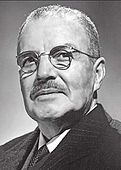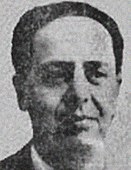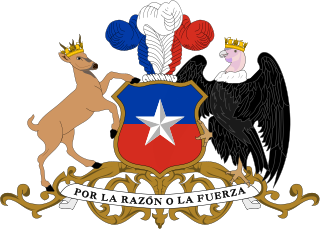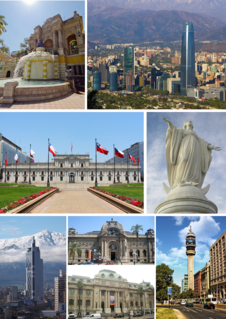
Juan Antonio Ríos Morales was a Chilean political figure, and President of Chile from 1942 to 1946, during the height of World War II. He died in office.

The Colombian Liberal Party is a centrist and social liberal political party in Colombia. It was founded as a classical liberal party but later developed a more social-democratic tradition, joining the Socialist International in 1999.

The Alberta New Democratic Party, commonly shortened to Alberta NDP, is a social-democratic political party in Alberta, Canada, which succeeded the Alberta section of the Co-operative Commonwealth Federation and the even earlier Alberta wing of the Canadian Labour Party and the United Farmers of Alberta. From the mid-1980s to 2004, the party abbreviated its name as the "New Democrats" (ND).

Gabriel González Videla was a Chilean politician. He was a deputy and senator in the Chilean Congress and was President of Chile from 1946 to 1952. He also helped draft the current Chilean constitution.

Elections in Cyprus gives information on election and election results in Cyprus.

The Alberta general election of 1921 was the fifth general election for the Province of Alberta, Canada. It was held on July 18, 1921, to elect members to the 5th Alberta Legislative Assembly. It was one of only four times that Alberta has changed governments.

Presidential elections were held in Chile on February 1, 1942. The result was a victory for Juan Antonio Ríos of the Radical Party, who received 56% of the vote.

Presidential elections were held in Chile on 25 October 1938. The result was a narrow victory for Pedro Aguirre Cerda of the Radical Party, who received 50.5% of the vote.

Presidential elections were held in Chile on September 4, 1946. The result was a victory for Gabriel González Videla of the Radical Party, who received 40% of the public vote and 75% of the Congressional vote.
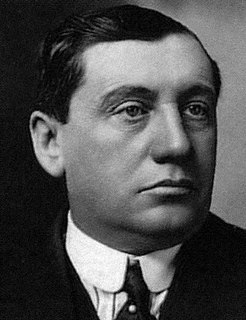
General elections were held in Chile on 30 October 1932. Arturo Alessandri of the Liberal Party was elected president, whilst the Conservative Party and Radical Party emerged as the largest parties in the Chamber of Deputies.

Presidential elections were held in Chile on 4 October 1931. The result was a victory for Juan Esteban Montero of the Radical Party, who received 64% of the vote.

Presidential elections were held in Chile on 22 May 1927, following the resignation of President Emiliano Figueroa. The result was a victory for Interior Minister Carlos Ibáñez del Campo, who ran as an independent and received 98% of the vote.

Presidential elections were held in Chile on 22 October 1925. They were the first direct elections in the country's history and the first to be held under the new 1925 constitution. The result was a victory for Emiliano Figueroa, who received 71% of the vote.
General elections were held in Luxembourg on 21 October 1945. They were the first elections held after the German occupation during World War II. As a result of the war, the political alliances of the interwar period had been ended. In their place were new parties; the Christian Social People's Party, the Luxembourg Socialist Workers' Party, and the Patriotic and Democratic Group in place of the Party of the Right, Socialist Party, and Radical Liberal Party respectively. It is regarded as a realigning election, as the election established the party political order, with four established parties, that would be maintained until 1974.
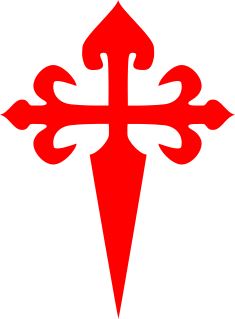
The Conservative Party of Chile was one of the principal Chilean political parties since its foundation in 1836 until 1948, when it broke apart. In 1953 it reformed as the United Conservative Party and in 1966 joined with the Liberal Party to form the National Party. The Conservative Party was a right-wing party, originally created to be the clericalist, pro-Catholic Church group.

The Presidential Republic is the period in the History of Chile spanning from the approval of the 1925 Constitution on 18 September 1925, under the government of Arturo Alessandri Palma, to the fall of the Popular Unity government headed by the President Salvador Allende on September 11, 1973. The period spans the same time as the "Development inwards" period in Chilean economic history.
The Radical Governments of Chile were in power during the Presidential Republic from 1938 to 1952.

General elections were held in Brazil on 4 October 1998, with a second round on 25 October. In the first round Fernando Henrique Cardoso was re-elected President and the governorships of 14 states were elected, in addition to all seats in the Chamber of Deputies and Legislative Assemblies, and one third of the seats in the Federal Senate. In the second round the governorships of 12 states and the Federal District were defined. This election was marked by the use of voting machines for the first time ever. They would have been used in all municipalities two years later, in the 2000 local elections.

Presidential elections were held in Finland in 1988. They were the first elections held under a new system. Previously, the public had elected an electoral college that in turn elected the President. For this election, the public directly elected the President on 31 January and 1 February, but also elected an electoral college that would elect the President if no candidate won over 50% of the popular vote. The college was increased in size from 300 to 301 seats to make a tie less likely, though this was still technically possible, as electors could abstain from voting.



